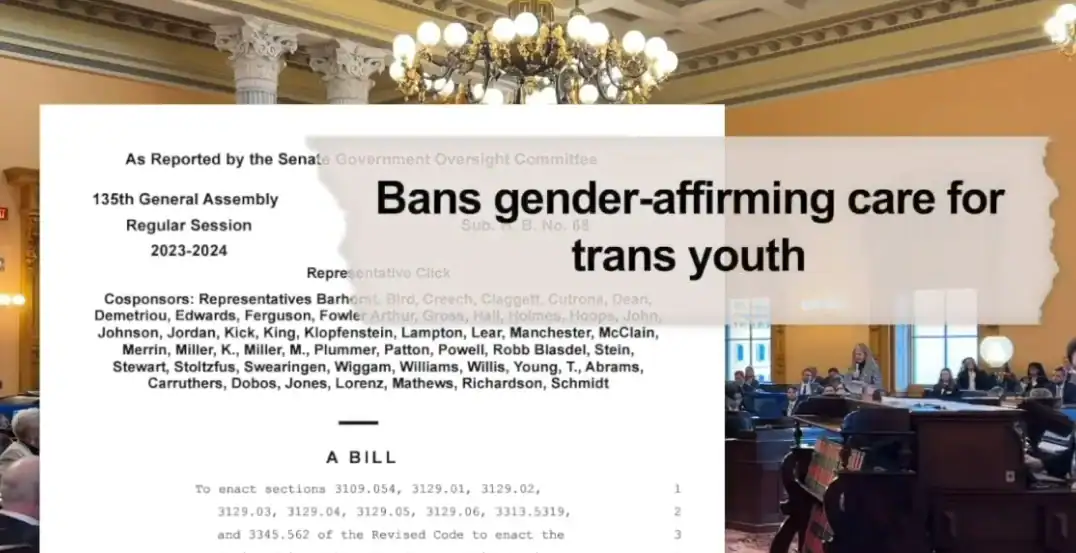Controversial Definition of Gender Tucked into Ohio Budget Bill

Listen to this article
By Angela Hay
The Budget Bill Beyond Numbers
“On June 30, 2025, Governor Mike DeWine signed Ohio’s state budget bill into law, with Republican-led tax cuts and a definition of sex and gender inserted late in the process, though it remains unclear which legislator proposed the language. Lawmakers said the language was intended to establish a foundation for future legislation, while critics warned it would fuel discrimination and legal challenges for Ohio residents.”
How the Bill Defines Sex and Gender
A “male,” according to the 3156-page bill, is “an individual belonging, at conception, to the sex that produces the small reproductive cell.” A “female” is “an individual belonging, at conception, to the sex that produces the large reproductive cell.”
“Sex” was legally defined for Ohioans as “the biological indication of male and female, including sex chromosomes, naturally occurring sex hormones, gonads, and unambiguous internal or external genitalia present at birth, without regard to an individual’s psychological, chosen, or subjective experience of gender.”
For the definition of “gender identity,” the legislature chose “an individual’s internal and subjective sense of self, disconnected from biological reality and sex and existing on an infinite continuum, that does not provide a meaningful basis for identification and cannot be recognized as a replacement for sex.”
After defining these terms, the legislature used the budget bill to declare Ohio’s official stance on sex and gender identity, stating that “it is the policy of the state of Ohio to recognize two sexes, male and female. These sexes are not changeable and are grounded in fundamental and incontrovertible reality.” These definitions closely mirror those used by the federal government under President Trump.
Legislators Silent on Who Added Language
At the time of writing, The Cleveland Observer was not able to determine which legislator proposed the inclusion of this language in the bill. The Observer will continue to seek clarification.” That shows ongoing accountability.
According to a staff member at the office of Rep. Brian Stewart (R-Ashville), this information is not considered a matter of public record and could not be disclosed. Rep. Stewart is the primary sponsor of the bill.
Per an auto-reply from the office of co-sponsor Sen. Andrew Brenner (R-Delaware), “it is difficult for (the Senator) to provide an immediate and individual response to each concern.”
A staff member at the office of co-sponsor Sen. Jerry Cirino (R-Kirtland) directed the question to Senate Communications Director John Fortney, who did not respond. In 2023, Fortney announced his online newsroom, stating, “We want to get you the facts on our policies and positions without the filters of the PC police.”
Supporters Defend the Need for Definitions
In the months leading up to the passage of the bill, Stewart insisted on the necessity of including these definitions in the budget bill. Speaking to the Statehouse News Bureau, Stewart compared defining gender to “saying the world is round instead of flat” and emphasized the importance of putting “that kind of discussion behind us.”
Medical experts and civil rights advocates dispute this analogy, noting that gender and biological sex are understood differently in scientific and social fields.
Legal and Fiscal Concerns Raised
Before the bill’s passage, many Ohioans went on record opposing the definitions and other anti-LGBTQIA+ provisions in the budget.
“HB96 doesn’t just propose a budget,” wrote James C. Knapp, Esq., of Cuyahoga County. “It proposes an agenda – one that disregards the dignity, rights, and survival of some of Ohio’s most vulnerable communities. This bill is cruel, unconstitutional, and fiscally irresponsible.”
“If passed, HB96 would expose Ohio to costly lawsuits, jeopardize federal funding, and create needless legal confusion for state agencies,” Knapp continued in his statement. “At the end of the day, it’s Ohio taxpayers who will be paying the price for defending a law that was never needed in the first place. If Ohio passes this language into law, we will be sued. And we will lose.”
Organizations Push Back
Dwayne Steward of Equality Ohio opposed the gender definitions, defunding homeless shelters, and banning queer books for minors. “There is no body of research that proves the need for these harmful amendments or any other anti-LGBTQ+ legislation, for that matter,” Steward said. “However, there is a large body of research that shows how anti-LGBTQ+ legislation hurts youth and families.”
“This bill endangers LGBTQ+ youth by isolating them, censoring their stories, and denying their existence,” said transgender veteran Ciara Keeton of the TransUnity Coalition. “It is abject cruelty wearing the costume of protection. It is unnecessary, and it is wrong.”
Evelyn Holbert of the TransUnity Coalition summarized the bill in two words: “inherently irrational.”
The Cleveland Observer was unable to obtain community quotes in support or oposition of the gender-definition section. The community is invited to share their perspectives at info@cleobserver.com
What Comes Next
While supporters of the budget bill argue the new definitions provide clarity for state policy, opponents predict costly lawsuits and challenges to Ohio’s compliance with federal law. Legal experts anticipate the language will be tested in court, and advocacy groups say they are already preparing for that fight. The ultimate impact of the measure, on both the state’s legal standing and the lives of Ohioans, remains uncertain.
Angela Hay is a journalism student at Capital University, graduating in December 2025. Over the summer she interns with the Cleveland Observer, where she focuses on telling unique stories from Greater Cleveland.



